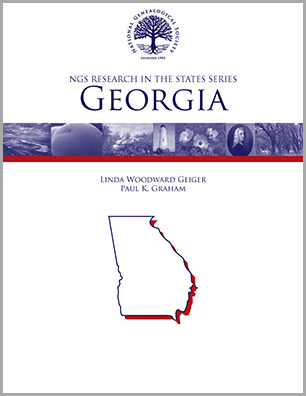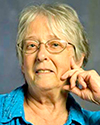 Family historians and genealogists whose ancestors lived in or passed through Georgia will find Research in Georgia an invaluable guidebook. Not only does it provide an important historical framework for researchers, it also guides them to a wealth of records that are not yet available online or in digitized formats.
Family historians and genealogists whose ancestors lived in or passed through Georgia will find Research in Georgia an invaluable guidebook. Not only does it provide an important historical framework for researchers, it also guides them to a wealth of records that are not yet available online or in digitized formats.
Extensive information is covered on where and how to access surviving records of the Creek and Cherokee federations, most of whom had left or were driven out of Georgia by 1838. The guide also details where to find records of African American slaves prior to 1818 and later when the state mandated registration of all slaves imported into Georgia. In addition, readers will learn how land grants were awarded in the eighteenth and nineteenth centuries, first employing the headright system and later a lottery system.
Research in Georgia includes an overview of major archives, libraries, and societies of interest to genealogists; colonial, federal, state, county, and municipal court records; military and religious records; and tax, probate, and vital records. Of note are colonial records that were amassed into thirty-two volumes, which can be found in major repositories.
Published by NGS, Research in Georgia is one volume in the Research in the States series edited by Barbara Vines Little, CG, FNGS, FUGA, FVG. It is available for purchase in the NGS online store in both PDF and print versions.

 Co-author Linda Woodward Geiger, Certified Genealogist Emeritus, was a principal and instructor for Regional In-depth Genealogical Studies Alliance (RIGSA). As an author, lecturer, and professional genealogists, she specialized in Georgia records, records of the National Archives at Atlanta, and documentation of Cherokee heritage.
Co-author Linda Woodward Geiger, Certified Genealogist Emeritus, was a principal and instructor for Regional In-depth Genealogical Studies Alliance (RIGSA). As an author, lecturer, and professional genealogists, she specialized in Georgia records, records of the National Archives at Atlanta, and documentation of Cherokee heritage. Paul K. Graham, AG, CG, is a professional genealogist and author whose articles have appeared in the NGSQ and Georgia Genealogical Society Quarterly. He was awarded a master’s degree in Heritage Preservation from Georgia State University and is a recipient of the ASG Scholar Award and the National Genealogical Society Award for Excellence: Genealogical Methods and Sources, and winner of the NGS Family History Writing Contest.
Paul K. Graham, AG, CG, is a professional genealogist and author whose articles have appeared in the NGSQ and Georgia Genealogical Society Quarterly. He was awarded a master’s degree in Heritage Preservation from Georgia State University and is a recipient of the ASG Scholar Award and the National Genealogical Society Award for Excellence: Genealogical Methods and Sources, and winner of the NGS Family History Writing Contest.